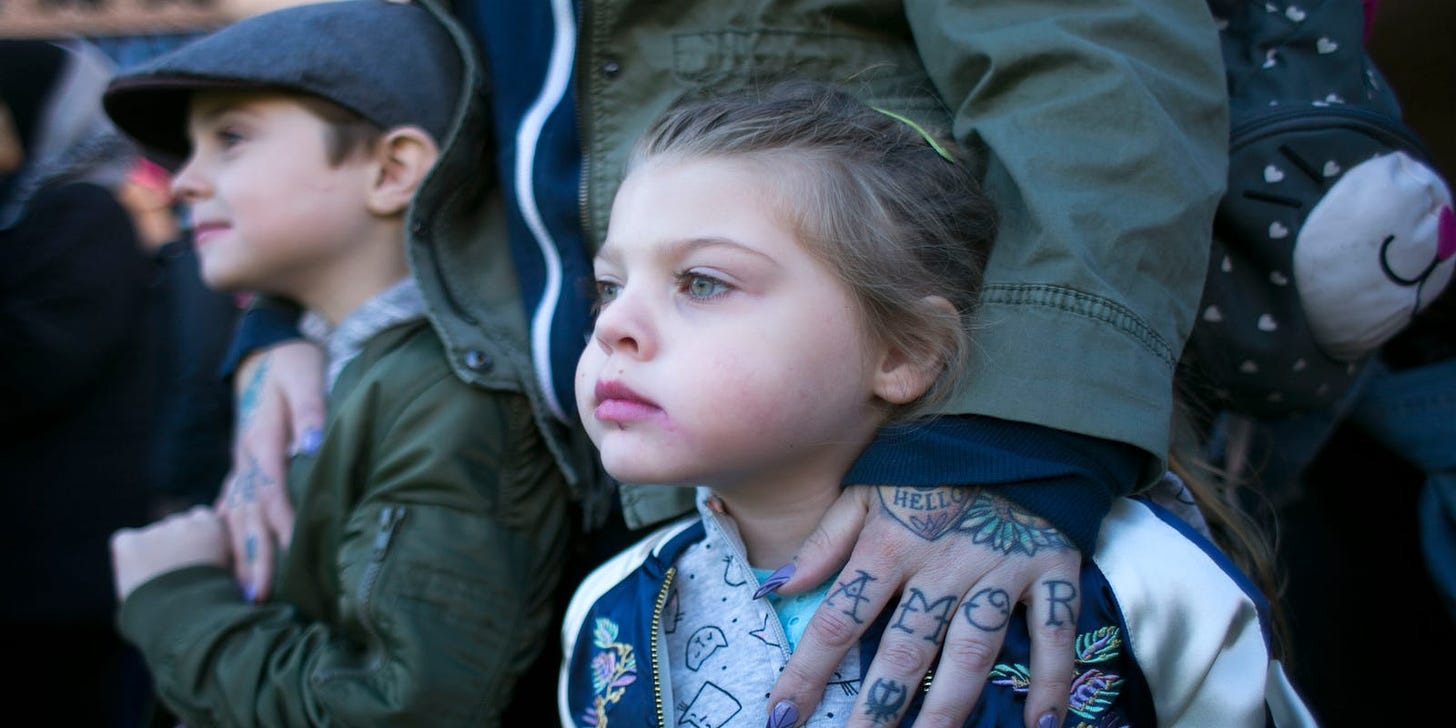When Feminism is Child Abuse
Feminist mothers’ (and some fathers’) words to their sons reveal insidious anti-male prejudice
In a recent video clip, a mother tells of how she stopped her five-year-old daughter from apologizing. The daughter’s apologies, which tended to be made when she was told “No,” were a red flag, the mom noted, for her daughter’s excessive concern for others. The mother wants her daughter to be comfortable advocating for herself. She wants her to “take up space,” and, above all, not to be sorry for wanting things.
This sort of advice seems typical of modern moms and daughters. It’s all the rage now to raise girls to be assertive and not to apologize.
What does a feminist mother tell her son? Nothing similar.
Whether in the classroom, in mainstream magazine articles, or in statements by politicians, boys learn that they should apologize. Their “taking up space” is a problem that may make girls uncomfortable. They need to be aware of girls’ discomfort and vulnerability, and they should be willing to put girls’ needs first.
The anti-male message is pervasive even, or especially, in articles by mothers of sons, as I discovered when I scoured the internet for feminist parenting advice. In these remarkable articles, mothers and some fathers openly admit to undermining and guilt-tripping their boys. They demonstrate the radical extent of feminism’s assault on the male psyche. What follows is a small, representative sample.
In 2016, the On Parenting section of The Washington Post published an alarming essay by Jody Allard, a feminist journalist. Allard’s article discussed the failure of her teenaged boys, ages 16 and 18, to be feminist allies. The sons, laments Allard, “refuse to acknowledge their own culpability” in misogyny. Here is a classic feminist Kafka trap: If the boys won’t admit they’re to blame, then they’re to blame for not admitting they’re to blame. In the revealingly-titled “My teen boys are blind to rape culture,” Allard’s anger at her sons’ disinclination to acknowledge the pervasiveness of rape is palpable in every line. “They aren’t willing to sacrifice their own comfort for my sake, or for anyone else,” she seethes. But one could more convincingly argue that it’s Allard who isn’t willing to sacrifice her comfort for the sake of her boys. Why does she insist that her children believe what she believes and see what she sees, even if they actually can’t see it or believe it? She explains that “in this broken system, anyone who isn’t with us is against us. Particularly, and especially, men. Even my own sons—even yours.”
It is a horrifying article in which the sons’ expressions of skepticism about rape culture make them indistinguishable, in their mother’s mind, from the ghoulish internet misogynists she conjures. “Not all men, they remind me, and my guts wrench as my own sons mimic the vitriol of a thousand online trolls,” she tells readers melodramatically. Notice how she redefines a simple factual statement as vitriol. That her sons might be expressing a natural resistance to unfair self-castigation seems never to occur to her.
It’s difficult to fathom the psychological discomfort of being one of those sons, growing up in an atmosphere heavy with moral disapproval, and responding to the mother’s impossible-to-appease rage. It may be no coincidence that just six months earlier, this same woman had written about the suicidal depression of one of her sons, stating that “My son’s depression doesn’t belong to me. I didn’t create it and I am not responsible for it.” Perhaps not, but the damning anger can’t help.
Unfortunately, Jody Allard’s feminist convictions are not at all unusual.
Some mothers begin their proselytizing of sons at an even earlier age. An article by feminist mother Lane Brown in the Christian Science Monitor, “NYC Candid Catcall Video: How Can We Make Our Sons Stop,” tells in toe-curling detail how a mother who watched a video about catcalling decided she would need to start lecturing her son, not yet two years old, about the objectification of women so that when he attends pre-school, for example, he will not go there with the thought “that girls are there to be looked at, or just to play the wife in a game of house.” Addressing her little boy in imagination, she outlines her standard of rectitude: “My hope of hope, before you even are able to form a sentence, is that you will never form a sentence that makes someone feel ashamed or embarrassed.” She realizes that she will have to repeat her injunctions again and again. One can only imagine the confusion, shame, and dread such lectures are likely to produce in a little boy trying to figure out his place in the world.
Put a phrase like “Raising my son to be a feminist” or “Speaking to my son about catcalling,” and you will find an abundance of online articles written mostly by mothers for other mothers about taming the masculine demon in their sons: “How to Raise a Feminist,” by Reva Seth, “How to Raise a Feminist Son,” by Claire Cain Miller, “How I’m Raising My Sons as Feminists,” by Alexis Barad-Cutler, and “10 Ideas For Raising a Feminist Son” by Tabby Biddle, to name a few. Often the hatred of maleness is overt. In a 2018 article called “#MeToo: Will My Son Grow Up to be a Rapist?” the writer, Louise Leontiades, finds many causes for concern in the behavior of her five-year-old boy who, unlike his much superior and easier-to-love seven-year-old sister, has trouble admitting that he is wrong and seems more interested in rough-housing than in emulating his curious and verbally-gifted female sibling. Rather than recognizing sex differences in children, the mother tells readers with narcissistic foreboding that “If predatory behavior is as ubiquitous among men as it appears and as I have experienced it to be, statistically it is likely that my son will violate someone, at some point, in his lifetime.” That grim expectation seems to shadow everything this little lad does, or fails to do, in a family home full of moral tests beyond his years.
Another feminist mom, Polly Dunning, in “Having a son went from being a dilemma to being the most valuable lesson of my life,” is less fatalistic than Leontiades, but no less doctrinaire in explaining how she plans to instruct and mold her son until she has made him into a living refutation of male privilege. Originally, we’re told, she was horrified to discover she was pregnant with a boy (a number of these mothers emphasize their unashamed preference for girls), but that having given birth to him, she relishes the opportunity to make him into a paragon of feminist virtue: “I will raise a feminist boy,” she tells us triumphantly, “Just like his father and grandfathers before him, but even better. I will point out sexism to him at every turn, and he will never get away with it without being called out.” She also notes that, as a woman who wanted a daughter, she will mother her son with female-preference in mind: “We love women so much we wanted daughters, and so we will raise sons to love and respect women. By having sons, we do feminism a great service.”
The foregoing articles represent twin poles of the discussion on sons: on the one hand, surrender to the inevitability of one’s son becoming a sexual abuser; and on the other, a faith-filled determination to produce a model feminist who knows that as a male, he is second best.
Typical is an article called “Talking to My Son About Street Harassment,” in Bloomberg City Lab, by Sarah Goodyear, in which a mother of a 13 year old tells how she instructs her son about his male responsibility to carry the burden of the many bad deeds of his sex, which include “everything from insisting that a girl smile on command to groping her when she’s standing next to you on the train. And worse.”
This mother is so intent on driving home to her son the seriousness of what girls experience that she doesn’t give a moment’s reflection to the effect of her harsh depiction on an adolescent boy. She tells us that she trusts her son, but then makes clear she doesn’t trust him: “My kid is a gentle soul and a generally decent young man. I trust his instincts and his heart. But that doesn’t mean I don’t feel the need to be quite direct and explicit about his responsibility to be a young man who always treats girls and women with respect—on the street and everywhere else.” The mother’s desire to believe in her son’s decency clashes with her feminist-informed repugnance for his masculinity.
While exhorting him about his responsibilities, she seems never to have warned him about girls to avoid: girls who make up false stories, or girls who use their sexual power to provoke fights between boys. It’s clear in all these articles that boys are always the problem, girls a precious resource to be cherished. The standard feminist perspective is expressed in “How to Raise Feminist Boys,” which quotes Tanith Carey that “it’s not boys who are the problem – it’s the way they have been raised in a traditionally male-dominated society to believe that a penis confers privilege.” What a relief to be told that as a young boy: you’re not the problem, but having a penis is a problem.
Mothers in these articles seem to have no concern about the dangers faced by boys or the psychological and emotional minefield of being told that there is nothing good about masculinity unless it exists in the service of girls and women.
They believe it their right to lecture and exhort, to shout and cry. In “A Feminist’s Guide to Raising Boys,” Bibi van der Zee tells with a certain zest how, arguing with her teenaged sons and husband about the MeToo movement at the dinner table one night, she “lost it and walked away in tears.” She goes on to say, “But you know what? I don’t regret it. Sometimes an argument should be that emotional.” Here’s a mother who has given herself permission to rant and cry to her sons about her ideology, tyrannizing over them with the help of bully tears. She doesn’t see it as psychological abuse because she’s so convinced of her righteousness.
There’s usually very little in any of these articles about the boys’ fathers: whether they are present in their sons’ lives, whether they counter the mother’s lectures and guilt-tripping. Unfortunately, there’s no guarantee that a present father would counter the guilt-tripping. Like the father in the Google commercial who used a fancy electronic device to instruct his son about rape on his son’s prom night, articles such as “5 Ways for Dads to Teach Their Sons to Respect Women,” by Jon Beaty, “Teaching Boys to Respect Women,” by Justin Coulson, and “Teaching Our Sons to Respect Women,” by Wayne Parker, push the standard assumption that only boys are ever exploitative or abusive.
Perhaps not all feminist parents raise their sons in this manner, but it’s near-impossible to find male-positive examples—and why should we expect any? Anti-male parenting makes sense for those who believe what feminists profess to believe. Feminist parents imagine themselves doing a public good by extricating their sons from toxic masculine entitlement. It doesn’t occur to them that what is being described is nothing less than emotional and psychological abuse.
No one objects, of course, to boys being taught about sexual self-restraint and respecting a girl’s “No.” But boys deserve far more. They need to be taught to protect and value themselves. They need to be taught all that is good about their masculinity—and its deranged detractors. They need to learn that girls often flaunt their sexuality and play at victimhood for attention. Obtaining consent will be useless if the girl claims otherwise, which is why boys need to choose carefully and act with discretion. Above all, boys need to know that their lives matter and that they are at risk in a society where sympathy lies mainly with the female sex.
At least as much as the girl told not to apologize, the boy deserves, above all, to grow up without feminist blame.






If we actually lived in a Society that was interested in “social justice,” then we’d be having conversations about toxic femininity and the non-stop sexism expressed by women and girls, all the while claiming the opposite is true. Girls are raised to be a “Princess,” a “higher” form of homo sapien that has no flaws and who only considers others rather than herself. The exact opposite is true.
In the Society I’ve lived in (Generation X) the only message I’ve ever gotten was that the only people who really matter are women and girls, the only interests that should ever be considered are those of women and girls. In work situations, I find that it has been mainly women who create toxic environments, ones that reflect only their interests, and if anyone dare not accept that social contract, then all hell is unleashed. A certain percentage are not this way, but I find that number to be very small.
From the moment Princess opens her eyes at birth, she is coddled and glorified beyond reason, so it is completely unsurprising that she would turn out to be a mean, snotty, condescending Narcissist. The other thing is that they tend to be neurotic by nature, their attitudes and beliefs are typically based on emotion rather than reason, and studies have shown that they prioritize feelings above truth and free speech, probably because it doesn’t serve their interests. Placing them at the top of the hierarchy and we now see a Society that cannot prioritize merit, skill, truth or free speech and free association over selfish, self-serving desires and emotions.
So much for “Daddy’s little girl,” the virtue signaling political correctness that has created most of this mess. Women in my experience are rarely victims of anything, they are at the top of the pyramid when it comes to being an Oppressor class, which is probably why Marxist targeted them so heavily to spread their religion, because they knew that the underlying Narcissism was all that was needed to light their fire to take down reason, logic and common sense. Looks like that calculation has paid dividends -
I'm in no way trying to diminish what these young boys are going through with this comment, but these mothers are mistreating their daughters too. Discouraging them from apologizing and being concerned for others, encouraging selfish ("empowered") behaviour, treating them like (a) golden child(ren) compared to their brother(s) ... in this kind of narcissistic dynamic, the scapegoats (in this case, the boys) often turn out better than the golden children ... more likely to recognize the unhealthy dynamics and try to break out ... I think? I realize being treated like this could easily lead these boys to grow up to hate themselves and fear/resent/hate women too.